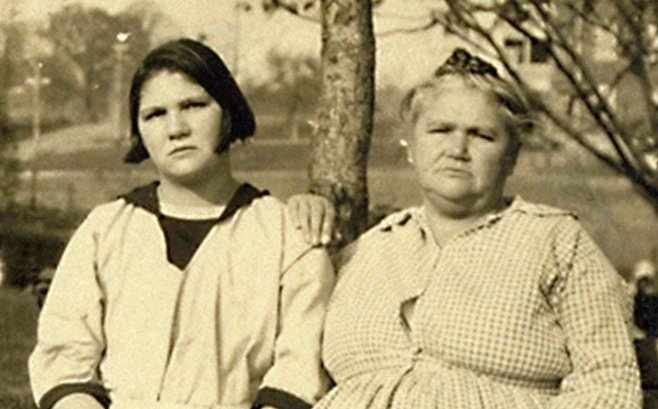Darwin Day in May: Buck vs. Bell Turns Eighty

Each February, admirers of Charles Darwin celebrate his birthday. “Darwin Day” is a celebration of secularism and of materialistic science, and particularly a celebration of Darwin’s theory of evolution. Some particularly enthusiastic Darwinists compare Darwin Day to Lincoln’s birthday. Their motto (I’m not making this up): “Lincoln freed the slaves; Darwin freed our minds.”
Some of us take a more nuanced view of Darwin’s legacy. This May is a poignant time to pause and to reflect on Darwin’s influence on American medicine and society. This May 2nd marked the 80th anniversary of the Supreme Court decision in Buck vs. Bell.
On May 2, 1927, the United States Supreme Court returned an 8 to 1 verdict in the case of Buck vs. Bell. Carrie Buck (above, with her mother) was a sixteen-year-old girl who was raped and had given birth to a daughter. Carrie had some problems in school, and her mom had some brushes with the law in her youth. Carrie’s social worker noted that she fit the definition of “feeble minded” under Virginia’s eugenic laws. She was involuntarily institutionalized at the Virginia Colony for Epileptics and Feeble-Minded, and she was ordered sterilized. She fought sterilization all the way to the Supreme Court.
Chief Justice Oliver Wendell Holmes wrote the majority decision:
We have seen more than once that the public welfare may call upon the best citizens for their lives. It would be strange if it could not call upon those who already sap the strength of the State for these lesser sacrifices, often not felt to be such by those concerned, in order to prevent our being swamped with incompetence. It is better for all the world, if instead of waiting to execute degenerate offspring for crime, or to let them starve for their imbecility, society can prevent those who are manifestly unfit from continuing their kind. The principle that sustains compulsory vaccination is broad enough to cover cutting the Fallopian tubes…Three generations of imbeciles are enough.
Carrie was sterilized on October 19, 1927.
Where did this modern “science” of eugenics come from? In Descent of Man, Darwin himself applied his theory of natural selection to the breeding of human beings:
…the weak members of civilised societies propagate their kind. No one who has attended to the breeding of domestic animals will doubt that this must be highly injurious to the race of man. It is surprising how soon a want of care, or care wrongly directed, leads to the degeneration of a domestic race; but excepting in the case of man himself, hardly any one is so ignorant as to allow his worst animals to breed.
Eugenicists set out to realize Darwin’s dream — to take “random” evolution in hand, and to breed, selectively, from our “best stock.” In the first half of the 20th cenury, sixty thousand Americans who were judged to be of inferior stock were involuntarily sterilized. Recently, Darwinists have scrambled to distance themselves from the obvious connection between Darwinism and eugenics. But the historical record is clear. The founders and scientific leaders of the eugenics movement–Darwin himself (in Descent of Man), his cousin Francis Galton (who coined the word ‘eugenics’) and his admirer Herbert Spencer (who coined the term ‘survival of the fittest’), and Darwin’s acolytes Karl Pearson, Ernst Haeckel, R.A. Fisher, Charles Davenport, and Harry Laughlin– were all fervent Darwinists.
Eugenics is still with us. It persists in the form of prenatal testing and abortion of handicapped or unwanted babies, in the growing acceptance of euthanasia of the seriously ill in the United States and of euthanasia of the handicapped in many countries in Europe. Culling the unfit, which Darwin wistfully endorsed in Descent of Man, is very much a part of 21st century medicine.
Darwin did “free our minds.” He freed many well-educated scientists and doctors from the traditional Judeo-Christian standard of human exceptionalism. He freed many doctors from the Judeo-Christian view that human beings have inherent dignity simply as human beings, and that the moral value of our actions is measured by what we do to help the least, not the best, of our brothers. Judeo-Christian ethics is the antithesis of social Darwinism, and of eugenics. The eugenic doctors who sterilized Carrie Buck were freed of their ethical moorings by Darwin’s ideas.
Darwin cast a long shadow on American medicine. It is fitting to take some time to remember the people who were caught in that shadow. Please find a moment to remember Carrie Buck, and how her life was changed, and why.
